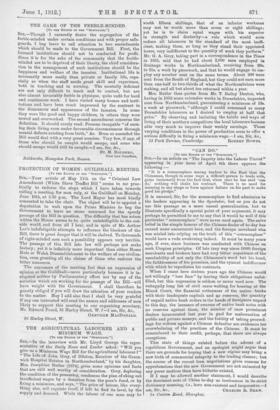"CAN DO."
[TO THE EDITOR OF TRIO " SPECTATOR."] SIR,—In an article on "The Inquiry into the Labour Unrest" appearing in your issue of April 6th there appears the following :- "It is a commonplace among traders to the East that the
Chinaman, though in some ways a difficult person to trade withy gains immensely from the fact that, when once he has said 'can do,' nothing will shake his contract. There is no need for insuring in any shape or form against failure on his part to make good his pledge."
It is unusual, Sir, for the commonplace to find admission to the leaders appearing in the Spectator, but as you do not use this passage as a mere casual generalization, but to illustrate specifically a special point of your argument, it may perhaps be permitted to me to say that it would be well if this • particular " commonplace " wore never used again. The naive belief in the simple honour of the Chinese dealer of to-day has caused some amusement here, and the foreign merchant who was misled into relying on the truth of this, "commonplace" would have a rude awakening indeed. It must be many years ago, if ever, since business was conducted with Chinese on such Utopian principles. Of late (any way since 1909) foreign merchants and brokers have had very bitter experience of the unreliability of not only the Chinaman's word but his bond, the faithlessness of his promises, and the cynical indifference with which he repudiates his contracts.
When I came here sixteen years ago the Chinese would not willingly " lose face" by leaving their obligations unful- filled, but this expression is seldom or never used now. The unhappily long list of civil cases waiting for hearing at the Mixed Court, the financial rottenness of the native banks with their inadequate capitals and no reserves, the quantity of unpaid native bank orders in the hands of foreigners unpaid to this day, the issuance of swarms of native bank notes with no reserves against them, the number of once prominent dealers incarcerated last year in gaol for malversation of public and private moneys, and the futility of taking proceed- ings for redress against a Chinese defaulter are evidences too overwhelming of the practices of the Chinese. It must be remembered to their credit, perhaps, that there are always exceptions.
This state of things existed before the advent of a republican Government, and an apologist might argue that there are grounds for hoping that a new regime may bring a new birth of commercial integrity to the trading classes; but the course of the recent loan negotiations gives reasons for apprehensions that the now Government are not animated by any purer motives than have hitherto existed.
If I may be allowed another statement, I would describe the dominant note of China to-day as lawlessness in its strict dictionary meaning, i.e., laws non-existent and inoperative.—I






































 Previous page
Previous page